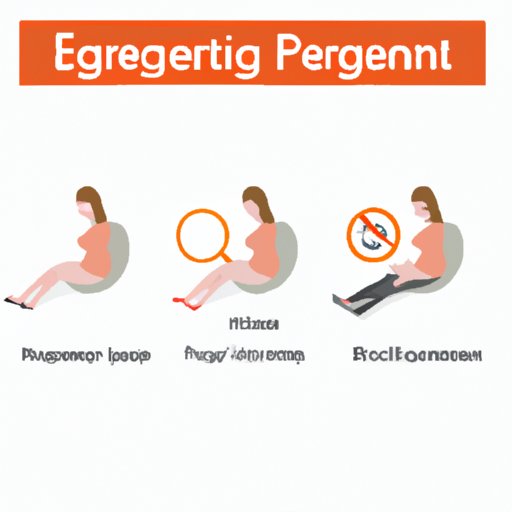
Introduction
Pregnancy is a beautiful experience, but sometimes things can go wrong. Ectopic pregnancy is a condition where the fertilized egg implants outside the uterus, usually in the fallopian tube. Although rare, ectopic pregnancies can be life-threatening, and it’s important for women to recognize the symptoms of ectopic pregnancy to receive timely medical attention.
In this article, we will discuss the symptoms of ectopic pregnancy and the importance of early detection. We will also explain the difference between a normal pregnancy and an ectopic pregnancy, warning signs, the impact of location on how symptoms are felt, and treatment options.
Understanding Ectopic Pregnancy: Common Symptoms You Shouldn’t Ignore
Ectopic pregnancy occurs when a fertilized egg implants outside the uterus. This condition is often caused by damage to the fallopian tube or hormone imbalances. Common symptoms of ectopic pregnancy include abdominal pain, vaginal bleeding, dizziness, and shoulder pain, which can be severe and sudden.
It’s essential not to ignore any unusual symptoms during pregnancy, as they can be the warning signs of an ectopic pregnancy. In addition to the common symptoms mentioned above, other signs of ectopic pregnancy include rectal pressure, menstrual-like cramping, and pain in the lower back or thighs.
When Pregnancy Goes Wrong: Warning Signs of Ectopic Pregnancy
Normal pregnancy occurs when a fertilized egg implants in the uterus, grows, and develops into a fetus. However, in the case of an ectopic pregnancy, the fertilized egg implants outside the uterus, typically in the fallopian tube. This condition is dangerous as the tube can rupture and cause life-threatening internal bleeding.
The warning signs of ectopic pregnancy include vaginal bleeding or spotting, pelvic pain, shoulder pain, and rectal pressure. If you experience these symptoms, seek medical attention right away.
How to Recognize the Signs of Ectopic Pregnancy Before It’s Too Late
It’s crucial to know your body and be aware of any changes that occur during pregnancy. Taking steps to monitor your symptoms can catch an ectopic pregnancy early, potentially increasing the chances of a successful treatment outcome. Some steps to take if you suspect an ectopic pregnancy include tracking your menstrual cycle, paying attention to vaginal discharge and taking pregnancy tests when necessary.
Medical tests involved in diagnosing an ectopic pregnancy include blood tests to measure hormone levels and an ultrasound to check the location of the fertilized egg.
Ectopic Pregnancy: What You Need to Know About Symptoms and Treatment
Many factors can lead to an ectopic pregnancy, including hormonal imbalances, damage to the fallopian tube, or smoking. The treatment process for an ectopic pregnancy involves surgical intervention or medication, depending on the severity of the case. If the fertilized egg has not ruptured, medication may be enough to stop its growth and protect your health. If surgery is necessary, the doctor may remove the fertilized egg or the fallopian tube.
Untreated ectopic pregnancy can lead to life-threatening complications such as internal bleeding, shock, or even death. That’s why it’s essential to recognize the signs of ectopic pregnancy and act fast to receive timely medical attention.
When Pregnancy Is Not in the Right Place: Signs and Symptoms of Ectopic Pregnancy
The symptoms of ectopic pregnancy can vary, depending on the location of the fertilized egg. Physical symptoms may include cramping, abdominal pain, and vaginal bleeding. In rare cases, ectopic pregnancy can present without any symptoms, making it difficult to detect.
The emotional effects of ectopic pregnancy can be overwhelming. Women may feel sad, guilty, or depressed, wondering why it happened to them. It’s important to seek emotional support as well as medical treatment to deal with the impact of an ectopic pregnancy.
Ectopic Pregnancy Symptoms: What Every Woman Should Be Aware Of
As mentioned earlier, the symptoms of ectopic pregnancy can be severe and sudden, or they may develop gradually. Some of the more subtle symptoms include bloating, nausea, and frequent urination. Even if you don’t usually experience the classic pregnancy symptoms, it’s essential to get checked if you suspect an ectopic pregnancy, as early detection can make a big difference in treatment outcomes.
The Importance of Early Detection: Recognizing Symptoms of Ectopic Pregnancy
Early detection of ectopic pregnancy is critical, as it can reduce the risk of complications and increase the chances of a successful treatment outcome. In some cases, an ectopic pregnancy can be detected as early as four weeks into pregnancy, which is why it’s vital to be vigilant about possible symptoms.
If left untreated, ectopic pregnancy can rupture the fallopian tube, causing internal bleeding and potentially fatal consequences. That’s why it’s essential to get checked immediately if you suspect you have an ectopic pregnancy.
Conclusion
Ectopic pregnancy can be a life-threatening condition if not detected early enough. Recognizing the symptoms of ectopic pregnancy and seeking timely medical attention can make a big difference in your treatment outcome. Remember to listen to your body, be aware of any changes, and seek help right away if you notice any of the warning signs of ectopic pregnancy.




